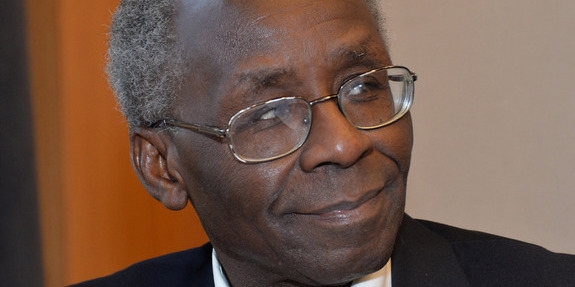It’s not poverty that is to blame for the weak African responses to Ebola, but bad leadership, says the head of the Nigerian Academy of Science, professor Oyewale Tomori.
In an interview in the Science Insider, Nigerian Academy of Science head, virologist professor Oyewale Tomori, didn’t mince his words criticizing bad government leaders for the raging Ebola epidemic in West Africa.
Isn’t that a bit harsh?
No, it is the truth. These government leaders can build monuments that cost millions of dollars and buy private jets, but they can’t build and maintain schools and clinics. If sick people could get to a clinic in time, the epidemic wouldn’t be as bad.
The keyword here is maintain. Building something is easy, but to train the doctors and nurses, organise supplies of medicine, get electricity, ensure hygiene, needs more capacity. Can poor countries be blamed for that?
Nigeria is not poor. No African country is too poor to provide basic amenities, such as schools, clinics, health centers or hospitals for her citizens.
Nigeria did contain the Ebola epidemic. Author Chimamanda Ngozi Adichie has described how doctors, nurses, laboratories and an emergency center in Lagos worked together to isolate the first patient. There were eight deaths but since then the country has been declared Ebola-free.
That is only because that first patient went to a private hospital. We did a few things right, and I praise Nigeria for that, but if the first patient had been admitted into a public hospital or had fallen sick days after arriving in Nigeria, we would have had a much bigger problem.
So, the governments in the affected countries could have stopped or limited the epidemic if they only wanted to?
That is exactly what I am saying. If over the past fifty years, ever since independence, our leaders had built hospitals and invested in the management systems and supply lines; if they had created an environment where doctors and nurses can work, with sufficient facilities and equipment, we would not see a brain drain from African doctors away from the continent. We would have enough doctors and clinics for everybody.
Isn’t fifty years a bit short for that? Western Europe took three hundred years to develop its health infrastructure. For centuries, national leaders built monuments and golden carriages for themselves and didn’t care for the poor.
Surely you are not saying that we must wait three hundred years? We cannot afford that and we don’t have to. We can be faster than Europe, we can learn from its obstacles, errors and mistakes. Today, technology has vastly improved the communication system. We have internet. Must we wait a century before we can use it and stick with the old dial-up telephone instead?
You say that government leaders in Africa must change their wrong priorities now. Stop building prestige projects and amassing riches, start caring for all citizens. Who is going to make them understand this and how?
It won’t be easy. We need a paradigm shift where a successful person is not the biggest boss with the flashiest car. Success must be redefined as being able to do a good job. That will be a big challenge.
Why?
Because job competence is at present not part of the criteria for those looking for a position in politics. It is ‘who you know’. To succeed, you need a ‘Godfather’ and when you are successful you, too, become a ‘Godfather’. Your first concern on the job, even if you were a good candidate, is to repay favour. As a result, the person in charge of controlling infectious diseases, may misapply funds to repay his Godfather. We need to look at our processes and ensure that competence is key, as well as accountability for the job done. As long as that is not the case, we won’t see improvement.
So there is a need for ‘Managers without Borders’ instead of ‘Doctors without Borders’?
It doesn’t have to come from the outside. We have good capable people in our countries. But we need to get them into the right positions and enable them to function in an atmosphere of accountability. We can then build a critical mass of competence, so that the few who are now exceptions, become the norm. Then those who feel that they need to use backdoors and shortcuts with the sole aim of getting richer will understand that there is another way. They will see that doing a good job actually gives you peace of mind.
This interview was conducted by Evelyn Groenink, ZAM Chronicle’s investigations editor.


